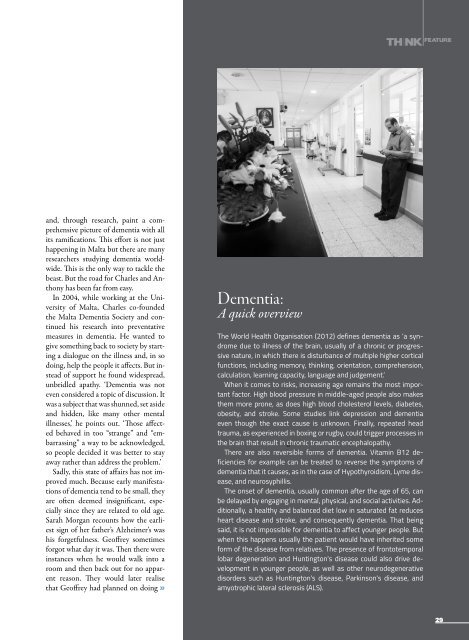You also want an ePaper? Increase the reach of your titles
YUMPU automatically turns print PDFs into web optimized ePapers that Google loves.
THINK Feature<br />
and, through research, paint a comprehensive<br />
picture of dementia with all<br />
its ramifications. This effort is not just<br />
happening in Malta but there are many<br />
researchers studying dementia worldwide.<br />
This is the only way to tackle the<br />
beast. But the road for Charles and Anthony<br />
has been far from easy.<br />
In 2004, while working at the University<br />
of Malta, Charles co-founded<br />
the Malta Dementia Society and continued<br />
his research into preventative<br />
measures in dementia. He wanted to<br />
give something back to society by starting<br />
a dialogue on the illness and, in so<br />
doing, help the people it affects. But instead<br />
of support he found widespread,<br />
unbridled apathy. ‘Dementia was not<br />
even considered a topic of discussion. It<br />
was a subject that was shunned, set aside<br />
and hidden, like many other mental<br />
illnesses,’ he points out. ‘Those affected<br />
behaved in too “strange” and “embarrassing”<br />
a way to be acknowledged,<br />
so people decided it was better to stay<br />
away rather than address the problem.’<br />
Sadly, this state of affairs has not improved<br />
much. Because early manifestations<br />
of dementia tend to be small, they<br />
are often deemed insignificant, especially<br />
since they are related to old age.<br />
Sarah Morgan recounts how the earliest<br />
sign of her father’s Alzheimer's was<br />
his forgetfulness. Geoffrey sometimes<br />
forgot what day it was. Then there were<br />
instances when he would walk into a<br />
room and then back out for no apparent<br />
reason. They would later realise<br />
that Geoffrey had planned on doing »<br />
Dementia:<br />
A quick overview<br />
The World Health Organisation (2012) defines dementia as ‘a syndrome<br />
due to illness of the brain, usually of a chronic or progressive<br />
nature, in which there is disturbance of multiple higher cortical<br />
functions, including memory, thinking, orientation, comprehension,<br />
calculation, learning capacity, language and judgement.’<br />
When it comes to risks, increasing age remains the most important<br />
factor. High blood pressure in middle-aged people also makes<br />
them more prone, as does high blood cholesterol levels, diabetes,<br />
obesity, and stroke. Some studies link depression and dementia<br />
even though the exact cause is unknown. Finally, repeated head<br />
trauma, as experienced in boxing or rugby, could trigger processes in<br />
the brain that result in chronic traumatic encephalopathy.<br />
There are also reversible forms of dementia. Vitamin B12 deficiencies<br />
for example can be treated to reverse the symptoms of<br />
dementia that it causes, as in the case of Hypothyroidism, Lyme disease,<br />
and neurosyphillis.<br />
The onset of dementia, usually common after the age of 65, can<br />
be delayed by engaging in mental, physical, and social activities. Additionally,<br />
a healthy and balanced diet low in saturated fat reduces<br />
heart disease and stroke, and consequently dementia. That being<br />
said, it is not impossible for dementia to affect younger people. But<br />
when this happens usually the patient would have inherited some<br />
form of the disease from relatives. The presence of frontotemporal<br />
lobar degeneration and Huntington's disease could also drive development<br />
in younger people, as well as other neurodegenerative<br />
disorders such as Huntington's disease, Parkinson's disease, and<br />
amyotrophic lateral sclerosis (ALS).<br />
29


